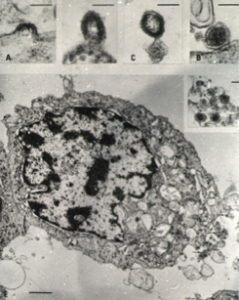Global Virus Network Issues Open Letter to WHO On Potent Human Carcinogen – Human T Cell Leukemia Virus-1
The Lancet publishes letter from top scientists and advocates from around the world to eradicate HTLV-1, a debilitating and deadly virus
Baltimore, MD, USA, May 10, 2018: The Global Virus Network (GVN), an international coalition of the world’s foremost medical virologists, comprising 41 Centers of Excellence and 7 Affiliates in 26 countries, dedicated to identifying and researching, combatting and preventing, current and emerging pandemic viruses that pose a critical threat to public health and well-being, held its 9th International Meeting in Melbourne, Australia on September 25-27, 2017 in partnership with the Peter Doherty Institute and the Institut Pasteur. Following the meeting’s impressive session on one of the most potent human carcinogens, human T cell leukemia virus subtype 1 (HTLV-1), a group of renowned scientists and activists are calling on the World Health Organization (WHO) to support the promotion of proven, effective transmission prevention strategies on this debilitating and deadly virus. An abbreviated version of the letter, Time to eradicate HTLV-1: an open letter to WHO, was published in The Lancet online and will be published in Lancet’s May 12 issue. The full letter was published on the GVN website.

As reported in PNAS by Poiesz et al. in 1980, images A-D show HTLV-I in the stages of budding and image E shows an ATL leukemic cell.
Said Robert C. Gallo, MD, Co-Founder and Director, Global Virus Network (GVN) and The Homer & Martha Gudelsky Distinguished Professor in Medicine, Co-Founder and Director, Institute of Human Virology, University of Maryland School of Medicine, a GVN Center of Excellence, “Since my colleagues and I discovered HTLV-1, the first known human retrovirus in 1980 and the first virus shown to directly cause human cancer and later shown also to cause neurological and immune disorders, we have learned that this destructive and lethal virus is causing much devastation in communities with high prevalence. The GVN created an HTLV-1 Task Force over three years ago, recognizing that there are no effective vaccines against this virus nor antiviral drugs to treat infections. During the GVN meeting last September, I was astounded to learn of the hyper-endemic numbers in the Aboriginal population of Australia. HTLV-1 is endemic in other regions including several islands of the Caribbean, and in countries such as Brazil, Iran, Japan and Peru. We hope that the WHO will agree with us, and begin to take action in promoting prevention strategies against HTLV-1.” Prof. Gallo is also Co-Chair of GVN’s HTLV-1 Task Force.
HTLV-1 is transmitted via the same routes as HIV-1, which was co-discovered as the cause of AIDS by Prof. Gallo and his colleagues, along with scientists at Institut Pasteur. HIV and HTLV-1 infect via infected body fluids including unprotected sexual intercourse, breastfeeding, sharing of needles, and the transfusion and transplantation of infected blood and organ donations. They are ancient viruses originating from non-human primates. HTLV-1 prevalence is more complex than HIV-1, in that it is highly endemic in some parts of the world, while surveillance data in many regions are not comprehensive and unknown for 6 billion persons.
“As with most sexually transmitted viruses, the majority of HTLV positive people transmit the virus unknowingly and are unaware that they are at risk of developing HTLV-1 associated diseases,” said Fabiola Martin, MD, MDRes, FRCP, FHEA, Sexual Health, HIV and HTLV Physician and scientist based in Brisbane/Australia. “The statistics speak for themselves and with it the support of the World Health Organization we will be able to support patients and promote effective HTLV-1 prevention strategies internationally.”

In a recent hospital-based cohort study by Lloyd Einsiedel, MD of the Baker Institute, in Central Australia, 33.6 % of Indigenous people tested HTLV-1 positive, reaching 48.5 % in older men. Further, the following infection rates are reported worldwide:
-
- Brazil – a prevalence rate of 1.3% in blood donors in certain regions, 1.8% in the general population and 1.05% in pregnant women with 33% of their family members including children found to be positive.
- Central African Republic – 7% of older, female Pygmies in the Southern region infected.
Gabon – a HTLV-1 prevalence of 5–10% has been observed in adults. - Iran – up to 3% of adults are infected in the Mashhad area while HTLV-1 is found across the country.
Jamaica – 6.1% in the general population and other Caribbean islands that have been studied have similar prevalence rates. - Japan – 1,000,000 are HTLV-1 positive and in Southern regions 10% of adults more than 50 years of age carry this virus.
- Nigeria – 850,000 to 1.7 million infected.
- Romania – infection rates include 5.3/10,000 among first-time blood donors, and 3-25% in poly-transfused patients.
According to Graham P. Taylor, MDMB, DSc, Professor of Human Retrovirology, Imperial College London, Honorary Consultant, National Centre for Human Retrovirology, St. Mary’s Hospital, London and member, GVN HTLV-1 Task Force, “The general neglect, globally, of the importance of HTLV-1 as a sexually transmitted infection that causes a range of debilitating inflammatory diseases does our patients, who request a sexual health screen, a disservice. It is also important to recognize the importance of mother-to-child transmission of HTLV-1 in the development of adult T-cell leukemia/lymphoma decades later. Despite the availability of highly sensitive and specific diagnostic tests for infection and a proven intervention, except for Japan, there are no antenatal screening programs. Evaluating the cost-effectiveness of such programs should now be a priority.”
In non-endemic areas, due to the migration of people and the sexual transmission of the virus, HTLV-1 and 2 have also been detected. Though most people remain undiagnosed, In the UK an estimated 20,000 – 30,000 people live with the virus, whilst in metropolitan France an estimated 10,000 – 25,000 people are HTLV-1 infected. In the USA, it is estimated that approximately 266,000 individuals are infected with HTLV-1 or -2, and that 3,600 people with HTLV-1 Associated Myelopathy/Tropical Spastic Paraparesis (HAM/TSP) remain undiagnosed.
 Yoshi Yamano, MD, PhD, Professor at St. Marianna University School of Medicine, Kawasaki, Japan and member of the GVN HTLV-1 Task Force, said, “To prevent mother to child infection, the Japanese government has been offering HTLV-1 screening for all pregnant women without cost. Taking a leadership role to promote research, it also provides grants for clinical trials and patient registries focused on ATLL and HAM/TSP.”
Yoshi Yamano, MD, PhD, Professor at St. Marianna University School of Medicine, Kawasaki, Japan and member of the GVN HTLV-1 Task Force, said, “To prevent mother to child infection, the Japanese government has been offering HTLV-1 screening for all pregnant women without cost. Taking a leadership role to promote research, it also provides grants for clinical trials and patient registries focused on ATLL and HAM/TSP.”
In addition to co-organizing the impactful sessions on HTLV during the GVN meeting last September, Prof. Gallo and Sharon Lewin, MD, PhD, director of The Peter Doherty Institute for Infection and Immunity, a GVN Center of Excellence, announced Christian Bréchot, MD, PhD, as the new President of the GVN. Prof. Bréchot is shaping the vision and strategy of the GVN and believes this call to action is an important step in catalyzing action initiated by GVN’s members.
“GVN offers a unique resource to leading public health officials including those at the WHO,” said Prof. Bréchot. “We look forward to developing significant partnerships with WHO and others to provide resources from our vast network to help bring to light urgent needs and close gaps in information such as this urgent crisis regarding HTLV-1. The GVN has begun to grow its network, including in Africa, and we hope that with this outreach that we will be better positioned to successfully combat neglected viral threats such as HTLV-1.”
 Said William Hall, MD, PhD, Co-founder of the GVN and Professor of Microbiology at the University College Dublin and Member of the GVN HTLV-1 Task Force, “This virus has been underestimated since the time of its discovery, perhaps because it is restricted to certain regions, or because it is not terribly infectious. However, for decades it has been known that HTLV-1 is highly carcinogenic and causes severe paralytic neurologic disease and immune disorders that can lead to bacterial infections. It is time that the WHO publicize prevention strategies against this devastating virus.”
Said William Hall, MD, PhD, Co-founder of the GVN and Professor of Microbiology at the University College Dublin and Member of the GVN HTLV-1 Task Force, “This virus has been underestimated since the time of its discovery, perhaps because it is restricted to certain regions, or because it is not terribly infectious. However, for decades it has been known that HTLV-1 is highly carcinogenic and causes severe paralytic neurologic disease and immune disorders that can lead to bacterial infections. It is time that the WHO publicize prevention strategies against this devastating virus.”
The GVN will hold its 10th International Meeting November 28-30 in Annecy, France with the theme, “Eradication and Control of (Re-)Emerging Viruses.” The meeting will be co-hosted by GVN Centers of Excellence, the Fondation Mérieux (FM) and the University of Veterinary Medicine Hannover (TiHo), and led by FM’s Prof. Hubert Endtz, TiHo’s Prof. Ab Osterhaus and GVN’s Prof. Christian Bréchot.
About the Global Virus Network (GVN)
The Global Virus Network (GVN) is a non-profit, 501(c)(3) organization, comprised of leading medical virologists from 26 countries. The GVN’s mission is to combat current and emerging pandemic viral threats through international collaborative research, training the next generation of medical virologists, and advocacy. For more information, please visit www.gvn.org. Follow us on Twitter @GlobalVirusNews
Media Contact:
Nora Samaranayake, GVN
410-706-8614
[email protected]
